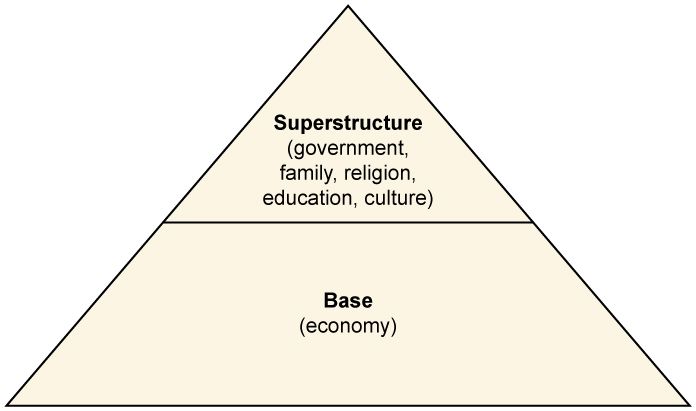
The economic basis determines social relations
Economic basis: The relations of production take a certain form in society. At a historical stage, relations of production form the economic system of society, forming the economic basis. Through this we distinguish between slave society, feudal society, capitalist society and socialist society.
Infrastructure: Without the economic basis of each social system, material value cannot be produced there, the productive forces of the society cannot be developed. If we consider the whole issue of production relations, we will see that the economic basis determines all other social relations. A superstructure that builds all social-relationships on an economic basis. This superstructure includes all political, legal, philosophical, ethical, religious and other opinions and ideas and their affiliated organizations and institutions. Such as- state, political party, legal-cultural-judicial-religious and more institutions.
The economic base-created infrastructure became an active force. It helps in building and strengthening the foundation of the economy. At present, the role of infrastructure related to the economic base is extensive. In the capitalist countries, the political superstructure plays a reactionary role because it protects the bourgeois economic base and the exploiting classes. But history shows that the destruction of the capitalist system is inevitable. The capitalist superstructure slows down social progress at one stage of development. It is a tool of global hegemonic monopolies. On the other hand, the socialist superstructure plays a progressive role and accelerates the development of production towards communism. It helps to improve the well-being of the people and improve their cultural values.
Economics as a social science studies production-relations in its complex interaction with productive forces and superstructure. Without understanding the subject of that interaction, the true nature of the relations of production and the economic basis of society will never be understood. Therefore, the capitalist relations of production cannot be analyzed without examining the deep contradictions between the productive forces of capitalism and the relations of production, without considering the types and methods of influence of the bourgeois state on the economic development of capitalism.
Method of production: There is a stage in the development of society. Each stage has its own productive force and its associated production-relationship. At a certain stage of historical development, the productive forces of society and the relations of production together form the mode of production. Every mode of production is built on the basis of ownership over the means of production. It is this ownership that fixes all the rules of production. It fixes the relationship of the working people with the means of production. So far, five modes of production have been observed in human society. Namely, the primitive communist mode of production and the slave-based, feudal, capitalist and socialist mode of production. In the trend of social development, these have taken place one after the other.
The connection of production materials with producers varies in different production methods. The predominance of private property-ownership in capitalism. In this case, the means of production is an oppressive force to the producer. In fact, capitalist production is based on the exploitation of wages and labor and its aim is only to plunder profits. On the other hand, the initial stage of communism is based on the social ownership of the means of production of socialism. There private ownership of the main tool of exploitation is abolished. As a result, the exploitation of human beings is stopped.
Classes: The relation of the producer to the means of production determines the classification of society. Class is a large part of the people between whom there are gaps, there are differences. Their place in social production is different, the relationship with the means of production is not the same. Their role in labor organization is different and their share of social resources is different. In a society exploited by the force of private ownership over the means of production, the exploiting classes usurp the fruits of the labor of other classes. In capitalist society the means of production are in the hands of the bourgeoisie, so they embezzle the fruits of the labor of the wage-workers. In a socialist society the means of production are owned by the working people and they produce in unison. In accordance with the labor given by suffering. As a result, there is no opportunity to exploit the labor of others. In this society, there is no place for human exploitation. This society is a society without exploitation.
Main classes in different modes of production: There are two main classes in the slave society, slaves and slave owners. In feudal society, landlords and feudal lords. In capitalist society, wage-workers and capitalists. In a socialist society, the working class and the cooperative peasantry live together, no one exploits anyone.
Topics of Economics Production and Consumption: Any product is produced for its use. Material value production keeps society alive. Production is to be non-stop. It can't stop for a day. Such as food, clothing, shelter and educational products.
Production is not an isolated verb. One thing is production and another is production, that's not the point. When the product is consumed, there is a need for re-production. Such material production is called reproduction process. Associated with this is the distribution, exchange and enjoyment of material values.
Production is for consumption by making a certain product. Production and consumption are the two beginning and the final stages of reproduction. There are two types of enjoyment. Productive consumption and personal consumption. If a product is used in a new production process, it is called productive consumption. Such as factory parts. Productive enjoyment is itself a production-process. If the product is used to meet the needs of the people, it is called personal consumption. Personal enjoyment is just enjoyment.
Production and consumption are closely intertwined. Production for consumption. Production creates the products of productive and personal consumption and precisely the quantity and structure of consumption. Production also gave rise to demand for new products, such as coal and oil, which were originally extracted from mines as fuel, but are now being used to produce chemicals as science and technology improve. In addition, modern vehicles are giving birth to improved roads. On production and consumption, Marx said, "Consumption is not without production, but production is not without consumption, because in that case production is useless."
There is a reciprocity between production and consumption on the one hand and conflict on the other. Guarantees against the exploitation-caused poverty and unemployment of capitalism. But even in socialism there is sometimes a conflict between production and consumption. But when conflict arises, planning brings equality between production and consumption. Basically the socialist economy is the planned economy. In socialism, when the production of consumer goods increases rapidly, it must be understood that the demand of the people has increased.

Distribution: Distribution is a matter between production and consumption. The material produced is distributed before consumption. The nature of the distribution of the products produced between different classes and social groups depends on the economic relations between the people engaged in production. Distribution is based on the ownership of the materials of production. In capitalism the owner of production is the bourgeois class, as a result of which the goods produced belong to the capitalist. So the distribution of these materials is aimed at ensuring higher profits for the capitalists and reducing the minimum wage of the workers. As a result, the working people in capitalism are constantly forced to wage a fierce struggle against wage-slavery to establish their rights.
In socialism, on the other hand, the situation is completely different. There is no capitalist. As a result, people work hard for themselves and for society. The materials produced there are distributed according to the quantity and quality of production work. That is why the material and cultural values of the people continue to improve.
Some bourgeois economists claim that distribution is production-neutral, that is, distribution is not related to production. They say that equitable distribution is capable of curing all the diseases of capitalism. In reality, in capitalism, equitable distribution is impossible, because the mode of distribution cannot be changed without changing the mode of production. The leading role in the interrelationship between production and distribution is that of production. How the distribution will be according to the type of production. Therefore distribution is dependent on production. Again distribution has an effect on production. Distribution affects the division of social labor. For these reasons, distribution accelerates or slows down the development of production. In socialism, the distribution of work according to quantity and quality is the only equitable.
Exchange:
Exchange is the link between consumption and distribution. Exchange is mainly expressed in the form of exchange of work between the employees of an enterprise. There is a division of labor within the enterprise. E.g., worker-foreman-engineer or others. They all take part in the same production process together and are directly connected to each other during the process by exchanging various activities.
The exchange takes place in various forms in different enterprises, industries and in different economic regions of the country. Within the division of social labor, enterprises of different industries exchange labor materials, raw materials and other materials with each other. It is seen that the production of one product is carried out in one venture and completed in another.
The economic form or type of exchange is fixed by ownership over the means of production. Exchanges can be planned or spontaneous, and can take the form of barter, as in primitive groups. It can also take the form of barter, which is just one of the historical forms of barter.
The first exchange of goods took place in 6000 BC. Its ultimate development is in capitalism. With the advent of capitalism, human labor, the means of production and the consumption of personal goods began to be bought and sold. People's love also started to be sold. The exchange, marketing, circulation of goods encompasses every sphere of social life. In capitalism the production of goods has become social and the exchange is for profit.
In socialism, labor is not a product. Trade is in the service of the people. According to the work, the distribution policy of consumer goods is effective and that is to meet the material and cultural needs of the people. At a certain stage of the development of society, the productive forces will develop enormously. Then the material value will produce a lot. A very well-organized distribution system will be created. New people will come to the society. If these conditions are met, there will be no need for exchange in the society.
Production provides the object of exchange and plays a vital role in exchange. Again the object also has a strong effect on production. Market expansion or contraction encourages or limits the possibility of increasing production. It thus forms a close link between exchange, production and consumption.
Continuity of the stages of reproduction: Production is the material value created by man for the existence and development of human society. This production does not stop once. This is because the distribution, exchange and consumption of the product is repeated. Distribution, exchange and enjoyment are one of the episodes of reproduction.
Distribution is what associates the product with consumption after it has been produced. That is, distribution makes the product in the hands of the consumer to meet its utility. It happens on the basis of production relations. In the case of production, where private ownership predominates, the capitalist benefits and the worker as a producer is exploited. The question of reproduction arises as the distribution leads the object to consumption. So the distribution is an episode of reproduction.
Consumption is the use of material values created in the process of production to meet the various needs of human beings. Enjoyment is the final stage of the reproduction process. Consumption is determined on the basis of production-relationship.
The production, distribution, exchange and consumption of material values are seen by some bourgeois economists as separate episodes. They see consumption as just the use of the product. They think that the speed of the production process is determined by eternal natural laws. In the light of that idea, they claim, production and consumption cannot be considered a matter of economics, the business of economics is only about distribution and exchange. Class interests work behind such demands of bourgeois economists. By separating the episodes of reproduction, bourgeois economists want to hide the sharp contradictions of capitalist relations of production and paint a false picture of the development of bourgeois society. But we have seen that the mode of production is at the root of the existence of any society. The production, distribution, exchange and enjoyment of material values are not isolated matters. The unity of these forms the system of production relations in the society and therefore everything is a matter of economics.


